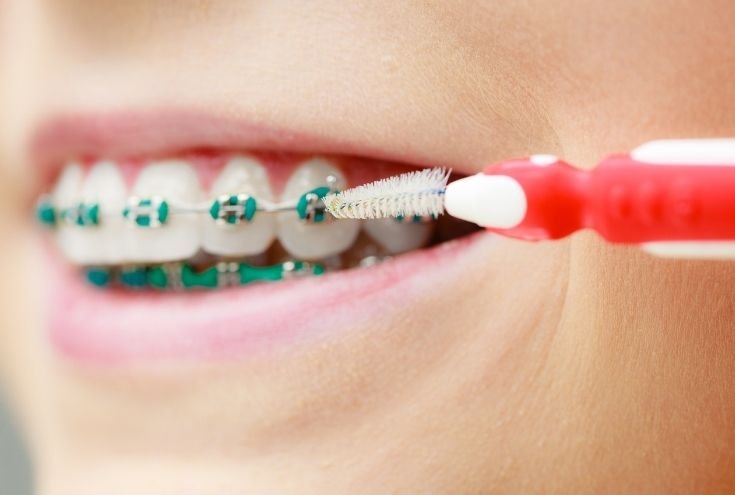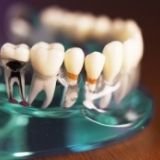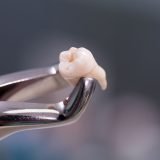Interdental Brushing
An interdental brush is a small, bristled brush that is used to clean between the teeth. Toothbrushing alone only cleans the outer surfaces. Most toothbrushes, even electric, cannot reach between the teeth well enough to remove plaque and debris.
Using an interdental brush ensures that all areas of your mouth are clean and free from plaque, preventing tooth decay and gum disease. They can be used at home, and are also used in the clinical setting.


Dentists use interdental brushes in a wide variety of cases, from treating periodontitis to the aftercare treatment of procedures such as implants.
Interdental brushes are available in different sizes to suit the different sized gaps between the teeth.
Professional brushes can also be used for specific circumstances such as brushing around a feature such as a crown or implant.
Using an interdental brush is similar to flossing, in that it uses the same motion to clean between teeth. You should use an interdental brush once a day, before or after your regular toothbrushing. If you are suffering from gum disease, you may need to use an interdental brush twice a day. Your dentist can advise you.
Be gentle when using an interdental brush. Work the brush between the teeth using a backwards-forwards motion. Never force the brush into a gap – choose a smaller size if it doesn’t fit. Repeat the motion a few times.


To remove the brush, pull it backwards through the gap. This brings any plaque and debris out with the brush.
Work your way around the mouth to clean each gap. You may need to bend the brush a little to brush between the back teeth properly.
Your gums may feel tender at first and may bleed a little. This is normal and should stop after a few days as all the plaque is removed and your gums become healthy. If your gums continue to bleed you should call your dentist immediately, or book in at our London clinic for an emergency appointment.
Affordable treatment:
Need New Teeth?
Removal, Replacement and Recovery
LATEST INNOVATIONS
Holford Partners Curaden uses the latest technology for dental implants and tooth replacement. You can be sure that you’ll leave the clinic without needing a second opinion.
COMPLETE TREATMENT
For dental implants, experience is critical. With more than 50 years of experience, our dentists deliver the most excellent dental implants in London – painless and effective.
QUALITY GUARANTEED
We use the highest quality materials and with the correct maintenance your dental implants can last up to 30 years. You can enjoy your new teeth just like your real ones.
Top Quality Painless Surgery
Join Holford Partners Curaden and let our team of surgeons and specialists provide the best advice and treatments for you. Our passion is prevention – we’re not just focused on remedial treatments like veneers and crowns. See how we can restore your smile. Book an appointment with one of our dentists for a complete checkup and treatment plan. Start your journey today!

Diagnostics
You undergo dental implant surgery if you have lost a tooth or multiple teeth. Yes, you can get one or more implants, depending on your situation.
This is why having a check-up with the dentist is a must before deciding to have an implant.
When you come to Holford Partners Curaden, we will diagnose you using the latest technology.
We have the latest X-Ray and intra-oral scanner that can show you a clear image of your teeth and the current situation. You will see exactly what’s going on.
We will determine whether an extraction or bone grafting will be necessary before implants and we’ll plan how many implants are required.
This way, our dentists can go through the different treatment options available to you and answer any questions you may have regarding a single tooth or multiple teeth replacements using dental implants.

Dental Implants
If you have recovered from an extraction or are missing a single tooth or multiple teeth and are eligible for an implant, we will give you all options to replace what you lost.
You can get an implant designed for a crown, bridge or dentures. It all depends on the situation of your teeth.
Implants can be a simple to complex procedure depending on the pre-surgical requirements and the number of surgeries involved. The number of teeth you need replacing will also play a significant role in determining the cost, complexity, and length of procedures.
Each implant takes 1-2 hours to complete, and we can assure you that the entire implant surgery will be painless.
We have a great success rate in placing dental implants, where very few fail and this is mostly dependent on your compliance in following your dentist’s instructions for aftercare. We will provide prescriptions to continue your comfort.
In as little as six months, we can proceed to get you the replacement teeth of your choosing, and you can win that smile and confidence back again.

Aftercare
After a single or multiple dental implants, you will be given medication to keep things painless and comfortable.
The dentist will instruct you not to irritate the surgical area and stick to a soft diet until it heals, which is usually around 7-10 days.
For smokers, you should avoid cigarettes for at least two weeks before and after to not disrupt the healing of your gums and bone.
It is vital that you guard the blood clot of your healing wound, avoiding sucking or putting pressure in your mouth like using a straw or spitting.
Depending on the complexity of your situation, your dentist will give you a schedule of check-ups for your aftercare – please follow the program.

Single Tooth Restoration
After a single dental implant you will have the final crown fitted around 3 months later to replace the missing tooth. Our crowns are hand made using the highest quality materials to match your existing teeth. They can be made of E-max, zirconia or ceramic to provide a durable and beautiful solution.
An implant abutment is used to connect the implant screw to the crown.
One crown is used to replace a tooth attached to one dental implant. You can have adjacent crowns for adjacent implants to replace lost teeth.

Multiple Teeth Restoration
Depending on the situation, a bridge, which is a set of crowns that are linked together, can either be attached to two or more implants or just one but co-fixed to one of your own teeth.
Fixed bridges usually require at least two implants and will take between 3-6 months to complete, taking into consideration the healing period.
While these seem too expensive, the good news is that our dentists will give you options that will consider the pace by which you are comfortable with.
We will help you make well-informed decisions that will lead you to satisfaction and wellness.

Multiple Teeth To Full Mouth Restoration
Holford Partners Curaden offers modern dentures, prosthetics made of high-standard acrylic resin and created to fit your mouth just like the real thing.
With implants, you can have partial dentures or complete dentures, depending on how much tooth replacement you require.
Implants can host a removable denture or a fixed denture.
Removable dentures are the cheaper alternative if you are unable to choose more permanent tooth replacement methods like crowns or bridges.
Get dentures from Holford Partners Curaden. Our dentures function and look like your original teeth, and nobody will be able to tell that they are replacements.

Extractions
When we diagnose you and prescribe an extraction, one of the top suggestions we will give you is to get implants.
Implants are ideally done ten weeks after extraction. It is ideal to do the surgery as soon as you completely heal because you can suffer significant bone loss in as little as three months.
We can extract multiple teeth and place multiple implants with our expertise and the latest technology. We can assure you that all procedures will be painless, comfortable, fast, and high-quality.
Losing your teeth can have a significant impact on anyone’s life. Many people lose confidence and the ability to socialise as well as they used to.
If you think you are having problems with your teeth or are looking to prevent losing them, book an appointment today.

Bone Grafting
The moment you lose your tooth, bone loss will begin to occur if a restoration is not used to replace the space made by the missing tooth. In some cases it can only take three to six months to lose most of the vital parts of the bone needed for dental implants.
Weak, thin, or narrow jawbones will not allow you to become an eligible candidate for dental implants.
The solution for this issue is bone grafting. Bone grafting ensures that you have a sufficient bone foundation available for a dental implant to be drilled into and fuse with.
We can either take bone from another part of your body or use animal bone or even a synthetic material.
After grafting, there are several months of healing time before you can proceed to dental implant surgery.
We use the best anaesthetics and ensure that everything will be comfortable and painless.
FAQs
How much are dental implants at Holford Curaden?
At Holford Partners Curaden our dental implants start from £1500 (excluding the crown) which may be a little more expensive than those provided by clinics outside of London. However, this is since the procedure in our clinic is of premium quality done by some of the most experienced dentists in the country.
It is vital to know how experienced your dentist is before you undergo dental implants. Here at Holford Partners Curaden, we have patients who travel from all over the country and abroad seeking our dental implant services.
Remember that a lousy surgery can lead to more complicated problems and more money and time is needed to fix them. We can go as far as to say that going for the premium service will guarantee you better savings than risking complications by cutting corners.
Dental implants and tooth replacements like crowns, bridges, and dentures present a long process but the long lasting results are totally worth the 3-6 months treatment period.
Do not waste your time and only choose our tested and proven expertise to ensure long-lasting comfort.
Who is an excellent candidate for dental implants?
Anyone with a decent amount of bone is an excellent candidate for dental implants. Once you’ve stopped growing after the age of 23 you are eligible for dental implants to replace lost or missing permanent teeth.
You can think of implants as a hook for your frame. You need a stable wall to affix it to.
If the wall is too thin, narrow or weak, you will have to prepare the wall first. Translating this situation to your jawbone, it means that you have suffered from bone loss.
Usually, bone loss happens when you lose your teeth. Within three to six months, significant shrinkage of the bone in the lost tooth area will occur.
When there has been significant bone loss, you will have to prepare it, and the solution for that is bone grafting. Bone grafting is done by supplementing your jaw bone with human, animal, or synthetic bone material, making it strong enough and ready for implants after some months of healing.
With a prepared jawbone, anyone can get a dental implant.
What are the disadvantages of dental implants?
The main disadvantage of dental implants is cost. They are not cheap procedures, and they take time, but the results are worth the 3-6 month time period.
However, they are the best solution for replacing your teeth. With dental implants, you are open to options like crowns, bridges, or even permanently fixed dentures.
All those options give you the most comfortable alternatives to the teeth that you have lost.
Also, dental implants are a surgical procedure. As for all surgeries, you are at risk of pain, discomfort, inflammation and infection.
However, there is a solution to the risks of surgery. If you follow your dentist’s aftercare instructions and take the medicines prescribed then you are on the right track for a smooth and easy recovery.
Your dentist at Holford Partners Curaden will do everything to make things painless and comfortable for you, but when you get back home, your situation is in your hands.
Avoid doing things that will compromise your healing wound like sucking, smoking, using a straw or intense exercise.
Stick to the diet you are recommended to follow.
On the other hand, the best way for you to avoid all these risks is prevention. Take care of your teeth by practising excellent oral health care and hygiene habits. Brush twice a day, floss or use interdental cleaners, use mouthwash, and, most importantly, visit your dentist at least twice a year for check-ups and cleanings.
When you feel like you have a problem with your teeth and gums, do not delay in getting it checked before the problem begins to escalate. Call the clinic as soon as possible to book for an emergency check-up.
If we can treat a minor issue earlier, you will be able to avoid complexities that can lead to more costly procedures.
Do you do online consultations?
We do not offer online consultation because dental check-ups require dentists to take a close look at your teeth and gums. Even if you had a powerful camera that you can put inside your mouth, you wouldn’t know how a health professional would angle it correctly.
We have Covid-19 protocols in place so that we can keep you and our staff safe.
How long do dental implants last?
Dental implants provide a permanent solution to lost or missing teeth and can last between 20 – 30 years depending on how well you maintain them.
While implants and replacement teeth are inorganic and not prone to decay, they are affixed to your bone and gums which require excellent maintenance.
It is essential that you practice conscientious care at home when you have implants and regular dental check-ups and hygiene visits are a must to ensure that they will last as long as possible.
How do you maintain dental implants?
To maintain your dental implants, you have to clean with a soft-bristle brush and low to non-abrasive toothpaste twice a day. It is vital that you brush around the implant crown to remove any lingering bacteria from food.
One of the best cleaning tools you can use would be a nylon-coated interdental brush so that you can reach areas not accessed by your regular brush. All oral hygiene products can be purchased during your visit to the clinic.
Your dentist might also prescribe you implant-specific floss and an oral irrigator for excellent maintenance.
Hence, it is vital that you regularly visit your dentist and hygienist so that you can have the best advice for cleaning your dental implants the right way.

Services
- Dental Checkups
- Diagnostics
- Hygiene Cleaning
- Fissure Sealants
- Fluoride Application
- Sports & Night Guards
- Composite Fillings
- Extraction & Surgery
- Pulp & Gum Therapy
- Orthodontics
- Gold Inlays
- Whitening
- Crowns & Veneers
- Implants
- Facial Aesthetics
Opening Hours
Friday: 8am – 5pm
Saturday & Sunday: closed
73 New Bond Street
London W1S 1RS
020 7499 9806

